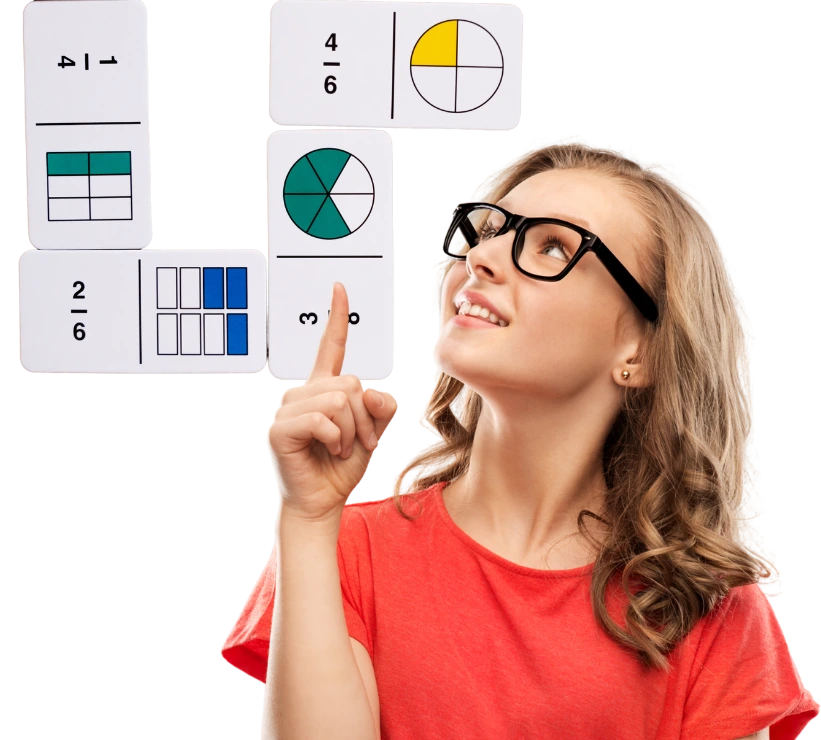
For students in elementary, number sense is an important and expansive topic in their learning progression. In grades 4 to 9, students extend their understanding of whole numbers to rational numbers and are introduced to irrational number.
A solid foundation of number sense in elementary school can set a student up for success in their future studies. If an emphasis on numbers is introduced to a child during their time in elementary. It will reflect on their understanding of comparison of quantities, generating equivalent representations of numbers, understanding rates, ratios, proportional relations, and computations of whole numbers, decimals, fractions and integers.
Having number sense is primarily understood as understanding the quantity represented by a number. Primary students start out by exploring the quantities of numbers less than 10 and later learn how to relate quantities to more significant numbers such as 10 and 100. By the end of a student’s primary grades, they should understand quantities associated with two and three-digit whole numbers.
During their junior grades, students can develop a sense of multidigit whole numbers, fractions, decimal, numbers, and percentages.
It is necessary that students learn to make sense of numbers in a context that relates to them personally since this can make mathematical understanding more meaningful and applicable.
The development of both computational procedures and quantity comprehension should be equally emphasized in order to gain an all rounded knowledge of mathematics.
We all know that fractions are a big part of mathematics, but how many of us really understand why?
As students progress through their elementary schooling, it is essentials for them to understand how the different types of numbers – whole numbers, fractions, percentages, and decimals – are related to ratio and proportionality. Research has shown that this type of context-based learning helps students build a strong sense of numbers and gain meaningful insights into their relationship with each other. This connection among numbers is fundamentals to obtaining comprehensive understanding: thus, providing students with varied contexts can ensure they have the opportunity to know these basics inside out.
An extensive study from The College Student Achievement Project found that understanding fractions are one of the most critical skills needed for college mathematics in both technology and business. It was also noted that fractions are one of the main areas in which many students lacked the necessary understanding.
Relationships are an essential part of understanding operations. When students understand these relationships, they are able to use alternative ways of computing with numbers.
For example, addition and subtraction are related as inverse operations, which students can learn to help compute problems.
When students understand the relationships between operations, they learn how numbers can be composed or decomposed. Understanding that a whole number can be broken into parts helps students develop their own strategies for addition and subtraction.
Tailor your child’s education to their unique needs and interests. Our flexible resources allow you to customize lessons and activities, ensuring your child’s learning journey is as unique as they are.

Knowing if your child has a sense of numbers can be challenging.
However, it is important look out for some common signs that could signal an underlying problem. Many children that are having difficulty with number sense tend to show signs at an early age and may have trouble with basic operations such as addition and subtraction.
It is also not uncommon to see kids struggle with everyday tasks like managing money, knowing how much time is passing, or judging the correct quantity of something. Therefore, it is essential as a parent to keep an eye out for any of these behaviours in order to ensure that your child develops a sense of numbers in the early stages of their childhood.
Students who have a strong understanding of number sense can represent quantities using diagrams and materials explaining how they show the quantity of numbers.
These students also understand the base ten relationships in the number system and can compare whole numbers with decimal numbers considering the value of the numbers. Understanding fractions and explaining the quantity relationship between the denominator of a fraction and the size of the fractional parts also shows a strong understanding of numbers sense.
Knowing if your child has number sense is something very parent/guardian should be concerned about, as having a grasp of this skill is essential for success in mathematics. Most parents know the basics of teaching simple math, like addition and subtraction, but number sense involves forming an understanding of concepts such as place value, number patterns and number order. This deeper understanding allows patterns and number order. This deeper understanding allows children to work confidently with numbers and can set them up for success in more advanced math classes. Parents who want their children to grow up well-rounded with knowledge should pay careful attention to whether or not their kids have number sense.
While number sense can take some time to develop, research suggests that meaningful activities that engage and excite children about number concepts can help accelerate the process.
Teaching number sense to a child involves presenting numbers in a way the child can understand, providing opportunities for number exploration, and guiding their discovery of number relationships. With guided instruction, children can connect number symbols with quantity, associate numbers with specific patterns, recognize numerical sequences and work on basic number problems.
Different activities such as markers and counters, number games, number stories, number puzzles or using specific manipulatives are a few ways to create experiences that strengthen understanding of numbers patterns, operations and relationships. Stories about counting or singing number songs can also be a fun and engaging way to help children practice their number sense. Such activities also spark interest in learning math which is the initial stepping stone in building number sense.
Teaching number sense to parents alongside their children can be an invaluable part of helping them understand their student’s homework. Number sense concepts help students make number-based decisions quickly, which can be a great tool for both students and their caregivers. it includes understanding number relationships, mental calculations, and estimation, all of which can help parents more effectively guide their children throughout the learning process. Teaching number sense also allows parents to talk with their kids about the math they are working on and better understand how it relates to everyday life.
Number sense is the ability to understand the quantity represented by a number. This includes understanding the value of numbers, their relationships to each other, and their order. It is an important math skill because it allows students to understand and work with mathematical concepts. Number sense also helps students develop a foundation for future math learning.
Number sense is essential for children because it helps them develop a strong foundation in mathematics. Without a good understanding of quantities and number relationships, children can struggle with more complex mathematical concepts later on. Number sense also helps children to become better problem-solvers and to think more logically.
One way to improve number sense in children is to provide them with opportunities to practice representing, comparing, ordering, counting and identifying numbers. Additionally, parents and teachers can help children understand basic mathematical concepts, such as addition and subtraction. Providing fun and interactive learning activities focusing on math can also help improve number sense.
Number sense strategies are various methods that can help students develop their understanding of quantities represented by numbers. Some common strategies include using manipulatives, drawing pictures, and counting out loud.